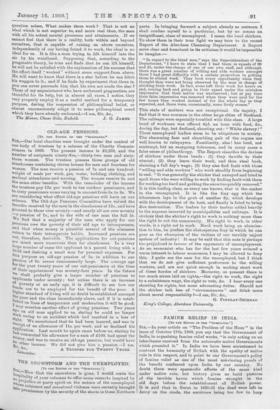I I 1 E SNOWSTORM AND THE UNEMPLOYED.
Si ITO THE EDITOR or THU "SPECTATOR...I Si ITO THE EDITOR or THU "SPECTATOR...I Now that the snowstorm is gone, I would crave the ePltality of your columns to offer some remarks inspired by vrejudice or party spirit on the nature of the unemployed existence and occasional violence were recently brought, Prerninence by the severity of the storm in these Northern' parts. In bringing forward a subject already so outworn I shall confine myself to a particular, but by no means an insignificant, class of unemployed. I mean the local shirkers. To show them in their true light we may turn to the recent Report of the Aberdeen Cleansing Department. A Report more clear and trenchant in its criticism it would be impossible to imagine:— " In regard to the hired men," says the Superintendent of the Department, "I have to state that I had them in squads of 20 and 25, under the charge of one of our own staff, and although there was a great number of willing and able workers amongst them I hail great diffipulty with a certain proportion in getting them to attend work. They took every opportunity when they thought they were not being observed by the man in charge of shirking their work. In fact, some loft their work for hours on end, coming back and going to their squad under the mistaken impression that their action was unobserved ; but at pay time their false impression was removed when they Were paid for the few hours they worked instead of for the whole day as they expected, and there were, occasionally, some lively scenes."
This state of matters was not exceptional. On inquiry, I
find that it was common in the other large cities of Scotland. The railways were especially troubled with this class. A large
band of workmen was offered 4id. an hour with food, &a, during the day, but declined, shouting out : " White slavery!" These unemployed loafers seem to be ubiquitous in society. The shamming face and shambling gait of the rogues are well known to ratepayers. Familiarity, alas 1 has bred, not contempt, but an easygoing tolerance, and in many cases a false sense of philanthropy. The Report classifies the devices of shirkers under three beads ; (1) they dawdle to their utmost; (2) they leave their work, and then stela baok, claiming a full day's wage; (3) they also find fault with those "willing and able workers" who work steadily from beginning to end. "It was generally the shirker that annoyed and tried to spoil those who were willing to work by finding fault with them for working. too hard and getting the snow too quickly removed." It is this loafing class, as every one knows, that is the canker in the unemployed. It is like the tiny egg which the ichneumon lays in the grub of another fly, which develops with the development of its host, and finally is fated to bring dire destruction. The loafers by their tactics added heavily to the expense incurred by municipalities and railways. It is obvious that the shirker's right to work is nothing more than the right to rob the community. His right to work, in other words, is a right not to work. Hard work being an abomina- tion to him, he 'prefers the obstreperOus fray in which he can pose as the champion of the victims of our terribly unjust system of industry ! It may be said that this note is perhaps too prejudiced in favour of the opponents of unemployment. As an economist who has for the last few years evinced a warm interest in labour economics, I may be allowed to deny this. I quite see the case for the unemployed, but I think that we do not give sufficient preference to the willing workers, and are not quick enough in making short work of these hordes of shirkers. Moreover, at present there is too much stress laid on rights,—the right to work, the right to a subsistence wage, the right to vote, &A. I hear every one shouting for rights, but none advocating duties. Should not the shirker talk less of "circumstances" and think more about moral responsibility P—I am, Sir, Sto., G. FINDLAY-SHIRRAS.
King's College, Aberdeen University.




































 Previous page
Previous page